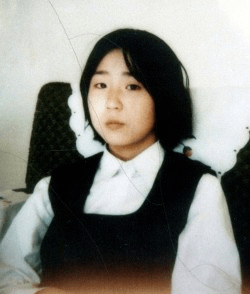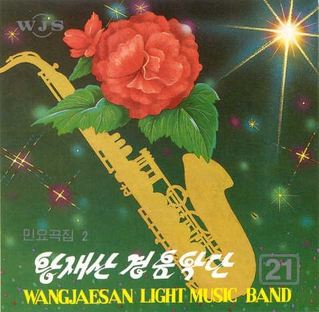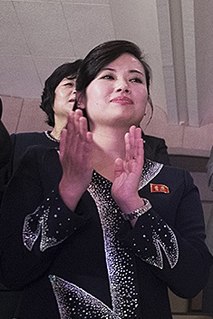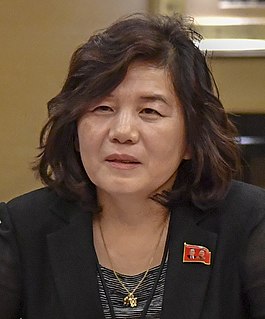
The contemporary culture of North Korea is based on traditional Korean culture, but has developed since the division of Korea in 1945. Juche ideology formed by Kim Il-sung (1948–1994) asserts Korea's cultural distinctiveness and creativity as well as the productive powers of the working masses.

Song Hye-rim was a North Korean actress, best known for being the one-time favored mistress of Kim Jong-il.

Megumi Yokota is a Japanese girl who was abducted by a North Korean agent in 1977 when she was a thirteen-year-old junior high school student. She was one of at least seventeen Japanese citizens kidnapped by North Korea in the late 1970s and early 1980s. The North Korean government has admitted to kidnapping Yokota, but has said that she died in captivity. Yokota's parents and others in Japan have publicly expressed the belief that she is still alive in North Korea and have waged a public campaign seeking her return to Japan.

Choe Yong-gon was the Supreme Commander of the Korean People's Army from 1948 to 1950, North Korean defence minister from 1948 to 1957, and the Chairman of the Standing Committee of the Supreme People's Assembly of the Democratic People's Republic of Korea of the Supreme People's Assembly of North Korea from 1957 to 1972.

The cinema of North Korea began with the division of Korea and has been sustained since then by the ruling Kim dynasty. Kim Il-sung and his successor Kim Jong-il were both cinephiles and sought to produce propaganda films based on the Juche ideology.

The Wangjaesan Light Music Band is a light music (kyŏngŭmak) group in North Korea. It is one of two popular music groups that were established by North Korea in the 1980s, both named after places where Kim Il-sung fought the Japanese in 1930s. It takes its name from Mount Wangjae in Onsong-gun, North Hamgyong Province, on the border with China, where Kim Il-sung is said to have held a meeting for anti-Japanese activities in 1933.

Sea of Blood is a propagandist North Korean opera credited to Kim Il-sung. It was first produced as an opera by Sea of Blood Theatrical Troupe in 1971. It was then later adapted into a novel by the Choseon Novelist Association of the 4.15 Culture Creation Group in 1973.
Ayşegül Aldinç is a Turkish singer and actress.

Ryu Mi-yong was the chairwoman of the North Korean Chondoist Chongu Party. She was a standing committee member of the 10th Supreme People's Assembly. She was known as a defector from South Korea to the North.
Jeon Ok was a Korean actress and singer. Jeon was referred to as "Queen of Tears" for her excellence at acting for tragic dramas.

The Flower Girl is a North Korean revolutionary genre theatrical performance, which was written by the country's sole President Kim Il-sung according to official North Korean sources. The performance is considered one of the "Five Great Revolutionary Operas", a group of classical, revolution-themed opera repertoires well received within North Korea. It was also made into a novel. A film adaption of the opera starring Hong Yong-hee was made in 1972.

Nothing to Envy: Ordinary Lives in North Korea is a 2009 nonfiction book by Los Angeles Times journalist Barbara Demick, based on interviews with North Korean refugees from the city of Chongjin who had escaped North Korea. In 2010, the book was awarded the BBC Samuel Johnson Prize for Non-Fiction. It was also a nonfiction finalist for the National Book Award in 2010.
Kim Kyong-hui is the aunt of current North Korean leader, Kim Jong-un. She is the daughter of the founding North Korean leader Kim Il-sung and the sister of the late leader Kim Jong-il. She currently serves as Secretary for Organization of the Workers' Party of Korea. An important member of Kim Jong-il's inner circle of trusted friends and advisors, she was director of the WPK Light Industry Department from 1988 to 2012. She was married to Jang Song-thaek, who was executed in December 2013 in Pyongyang, after being charged with treason and corruption.

Hyon Song-wol is a North Korean singer, band leader, and politician. She is the leader of the Moranbong Band and of the Samjiyon Orchestra. She was formerly a featured vocalist for the Pochonbo Electronic Ensemble in the early 2000s, a pop group which found fame in North Korea in the late 1980s and 1990s. She has been a member in the Central Committee of the Workers' Party of Korea since 2017.

Ri Sol-ju is the current First Lady of North Korea as the wife of Supreme Leader Kim Jong-un.

Korean revolutionary opera (Korean: 조선혁명가극) is a tradition of revolutionary opera in North Korea based on that of China during the Cultural Revolution. It is characterized by a highly melodramatic style and reoccurring themes of patriotism and glorification of Juche, President Kim Il-sung, and the working people, as well as a focus on socialist realist themes. Composers of North Korean revolutionary opera are employed by the North Korean government and the fundamental principles of North Korean revolutionary opera were dictated by Kim Jong-il in his speech On the Art of Opera.
The Moranbong Band, also known as the Moran Hill Orchestra, is a North Korean girl group. The original members were selected by the country's supreme leader Kim Jong-un. Performing interpretive styles of pop, rock, and fusion, they are the first all-female band from the DPRK, and made their world debut on 6 July 2012. Their varied musical style has been described as symphonic because it is "putting together different kinds of sounds, and ending in a harmonious, pleasing result."
Choe Ik-gyu, also known under the pseudonym Choe Sang-gun, is a North Korean film director, propagandist, and politician.

Choe Son-hui is the Minister of Foreign Affairs of North Korea. Previously the First Vice Minister of Foreign Affairs, she was appointed Minister on 11 June 2022, becoming the first woman to hold the position and is one of few North Korean women holding a high-level office.
Ri Kyong Suk is a North Korean singer.












